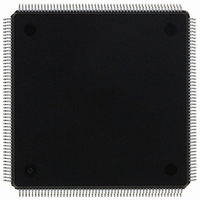MCF5307AI90B Freescale Semiconductor, MCF5307AI90B Datasheet - Page 87

MCF5307AI90B
Manufacturer Part Number
MCF5307AI90B
Description
IC MPU 32BIT COLDF 90MHZ 208FQFP
Manufacturer
Freescale Semiconductor
Series
MCF530xr
Datasheets
1.MCF5307AI66B.pdf
(484 pages)
2.MCF5307AI66B.pdf
(16 pages)
3.MCF5307AI66B.pdf
(2 pages)
Specifications of MCF5307AI90B
Core Processor
Coldfire V3
Core Size
32-Bit
Speed
90MHz
Connectivity
EBI/EMI, I²C, UART/USART
Peripherals
DMA, POR, WDT
Number Of I /o
16
Program Memory Type
ROMless
Ram Size
4K x 8
Voltage - Supply (vcc/vdd)
3 V ~ 3.6 V
Oscillator Type
External
Operating Temperature
0°C ~ 70°C
Package / Case
208-FQFP
Maximum Clock Frequency
90 MHz
Maximum Operating Temperature
+ 105 C
Mounting Style
SMD/SMT
Minimum Operating Temperature
0 C
Family Name
MCF5xxx
Device Core
ColdFire
Device Core Size
32b
Frequency (max)
90MHz
Instruction Set Architecture
RISC
Supply Voltage 1 (typ)
3.3V
Operating Temp Range
0C to 70C
Operating Temperature Classification
Commercial
Mounting
Surface Mount
Pin Count
208
Package Type
FQFP
Program Memory Size
8KB
Cpu Speed
90MHz
Embedded Interface Type
I2C, UART
Digital Ic Case Style
FQFP
No. Of Pins
208
Supply Voltage Range
3V To 3.6V
Rohs Compliant
Yes
Lead Free Status / RoHS Status
Lead free / RoHS Compliant
Eeprom Size
-
Program Memory Size
-
Data Converters
-
Lead Free Status / Rohs Status
Lead free / RoHS Compliant
Available stocks
Company
Part Number
Manufacturer
Quantity
Price
Company:
Part Number:
MCF5307AI90B
Manufacturer:
FREESCAL
Quantity:
153
Company:
Part Number:
MCF5307AI90B
Manufacturer:
Freescale Semiconductor
Quantity:
10 000
Part Number:
MCF5307AI90B
Manufacturer:
FREESCALE
Quantity:
20 000
- Current page: 87 of 484
- Download datasheet (6Mb)
if bcc is a forward branch && CCR[7] == 1
Table 2-17 shows timing for Bcc instructions.
2.8 Exception Processing Overview
Exception processing for ColdFire processors is streamlined for performance. Differences
from previous M68000 Family processors include the following:
ColdFire processors use an instruction restart exception model but require more software
support to recover from certain access errors. See Table 2-18 for details.
Exception processing can be defined as the time from the detection of the fault condition
until the fetch of the first handler instruction has been initiated. It is comprised of the
following four major steps:
• A simplified exception vector table
• Reduced relocation capabilities using the vector base register
• A single exception stack frame format
• Use of a single, self-aligning system stack pointer
1. The processor makes an internal copy of the SR and then enters supervisor mode by
2. The processor determines the exception vector number. For all faults except
3. The processor saves the current context by creating an exception stack frame on the
setting SR[S] and disabling trace mode by clearing SR[T]. The occurrence of an
interrupt exception also forces SR[M] to be cleared and the interrupt priority mask
to be set to the level of the current interrupt request.
interrupts, the processor performs this calculation based on the exception type. For
interrupts, the processor performs an interrupt-acknowledge (IACK) bus cycle to
obtain the vector number from a peripheral device. The IACK cycle is mapped to a
special acknowledge address space with the interrupt level encoded in the address.
system stack. ColdFire processors support a single stack pointer in the A7 address
register; therefore, there is no notion of separate supervisor and user stack pointers.
As a result, the exception stack frame is created at a 0-modulo-4 address on the top
of the current system stack. Additionally, the processor uses a simplified
then the bcc is predicted as taken
else if bcc is a backward branch
then the bcc is predicted as taken
Opcode
Table 2-17. Bcc Instruction Execution Times
bcc
Freescale Semiconductor, Inc.
For More Information On This Product,
Correctly as Taken
Predicted
1(0/0)
Chapter 2. ColdFire Core
Go to: www.freescale.com
Correctly as Not
Predicted
Taken
1(0/0)
Exception Processing Overview
Incorrectly
Predicted
5(0/0)
2-47
Related parts for MCF5307AI90B
Image
Part Number
Description
Manufacturer
Datasheet
Request
R
Part Number:
Description:
Manufacturer:
Freescale Semiconductor, Inc
Datasheet:
Part Number:
Description:
Mcf5307 Coldfire Integrated Microprocessor User
Manufacturer:
Freescale Semiconductor, Inc
Datasheet:
Part Number:
Description:
Manufacturer:
Freescale Semiconductor, Inc
Datasheet:
Part Number:
Description:
Manufacturer:
Freescale Semiconductor, Inc
Datasheet:
Part Number:
Description:
Manufacturer:
Freescale Semiconductor, Inc
Datasheet:
Part Number:
Description:
Manufacturer:
Freescale Semiconductor, Inc
Datasheet:
Part Number:
Description:
Manufacturer:
Freescale Semiconductor, Inc
Datasheet:
Part Number:
Description:
Manufacturer:
Freescale Semiconductor, Inc
Datasheet:
Part Number:
Description:
Manufacturer:
Freescale Semiconductor, Inc
Datasheet:
Part Number:
Description:
Manufacturer:
Freescale Semiconductor, Inc
Datasheet:
Part Number:
Description:
Manufacturer:
Freescale Semiconductor, Inc
Datasheet:
Part Number:
Description:
Manufacturer:
Freescale Semiconductor, Inc
Datasheet:
Part Number:
Description:
Manufacturer:
Freescale Semiconductor, Inc
Datasheet:
Part Number:
Description:
Manufacturer:
Freescale Semiconductor, Inc
Datasheet:
Part Number:
Description:
Manufacturer:
Freescale Semiconductor, Inc
Datasheet:











